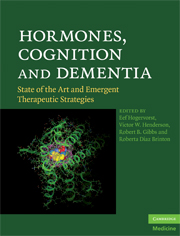Book contents
- Hormones, Cognition and Dementia
- Hormones, Cognition and Dementia
- Copyright page
- Contents
- Contributors
- Preface
- Section 1 Estrogens and cognition: perspectives and opportunities in the wake of the Women's Health Initiative Memory Study
- Chapter 1 Women's Health Initiative Memory Study (WHIMS) program: emerging findings
- Chapter 2 Identifying risk factors for cognitive change in the Women's Health Initiative: a neural networks approach
- Chapter 3 Estrogen therapy – relationship to longevity and prevalent dementia in the oldest-old: the Leisure World Cohort Study and the 90+ Study
- Chapter 4 The critical window hypothesis: hormone exposures and cognitive outcomes after menopause
- Chapter 5 Animal studies that support estrogen effects on cognitive performance and the cholinergic basis of the critical period hypothesis
- Chapter 6 The healthy cell bias of estrogen action through regulating glucose metabolism and mitochondrial function: implications for prevention of Alzheimer's disease
- Section 2 Varieties of estrogenic therapy
- Section 3 Potential modulators and modifiers of estrogenic effects
- Section 4 Possible genetic factors related to hormone treatment effects
- Section 5 Testosterone, estradiol and men, and sex hormone binding globulin
- Section 6 Gonadotropin effects
- Index
- Plate Section
Chapter 1 - Women's Health Initiative Memory Study (WHIMS) program: emerging findings
from Section 1 - Estrogens and cognition: perspectives and opportunities in the wake of the Women's Health Initiative Memory Study
Published online by Cambridge University Press: 06 July 2010
- Hormones, Cognition and Dementia
- Hormones, Cognition and Dementia
- Copyright page
- Contents
- Contributors
- Preface
- Section 1 Estrogens and cognition: perspectives and opportunities in the wake of the Women's Health Initiative Memory Study
- Chapter 1 Women's Health Initiative Memory Study (WHIMS) program: emerging findings
- Chapter 2 Identifying risk factors for cognitive change in the Women's Health Initiative: a neural networks approach
- Chapter 3 Estrogen therapy – relationship to longevity and prevalent dementia in the oldest-old: the Leisure World Cohort Study and the 90+ Study
- Chapter 4 The critical window hypothesis: hormone exposures and cognitive outcomes after menopause
- Chapter 5 Animal studies that support estrogen effects on cognitive performance and the cholinergic basis of the critical period hypothesis
- Chapter 6 The healthy cell bias of estrogen action through regulating glucose metabolism and mitochondrial function: implications for prevention of Alzheimer's disease
- Section 2 Varieties of estrogenic therapy
- Section 3 Potential modulators and modifiers of estrogenic effects
- Section 4 Possible genetic factors related to hormone treatment effects
- Section 5 Testosterone, estradiol and men, and sex hormone binding globulin
- Section 6 Gonadotropin effects
- Index
- Plate Section
Summary
- Type
- Chapter
- Information
- Hormones, Cognition and DementiaState of the Art and Emergent Therapeutic Strategies, pp. 1 - 10Publisher: Cambridge University PressPrint publication year: 2009
- 1
- Cited by

